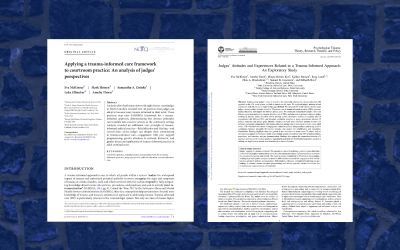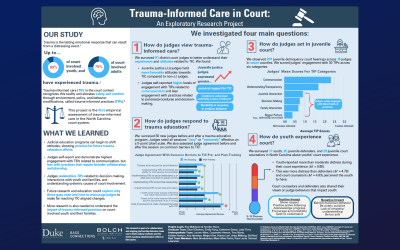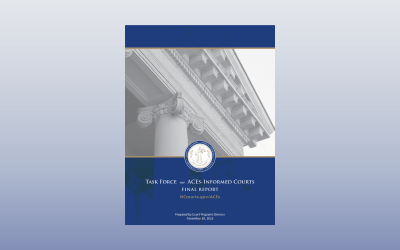Trauma Education for the Bench, Administrators, and Counsel
The Bolch Judicial Institute at Duke Law is a national leader in education and research relating to the use of trauma-informed practices in court.
Among other initiatives, the Institute provides trauma education programs for judges around the country and performs cutting-edge research on how judges interact with court users. The Institute created the first ever trauma-focused full-day new judges orientation program, led the creation of a bench card on trauma-informed practices, and launched a large-scale research project investigating the use of trauma-informed practices in juvenile delinquency courts.
We are committed to improving court experiences — and outcomes — for everyone, and are using the knowledge of judges, attorneys, social scientists, and doctors to do so.
Education Initiatives
The Institute provides educational programs to judges and court administrators on trauma-informed practices and systems-level change. So far, we have reached leaders from Arizona, California, Louisiana, North Carolina, Pennsylvania, and lectured nationally as part of the State Department Speaker Series. Contact amelia.thorn@law.duke.edu for more information on the Institute’s work in trauma education and trauma research or to request a trauma training or consultation.
Research Initiatives
The Institute and its research team have published widely on its studies about judges, their views on trauma, their in-court behaviors, and their influence on court-involved youth.
Community Initiatives
The Institute is also involved in working alongside judges and the courts to help improve their connection to communities. Our judicial incubator program brings judges together to try new trauma-informed practices, and our courthouse spaces project works to improve physical in courtrooms and courthouses.
Why Focus on Courts?
We encourage judges to use their unique power as community leaders to better address four realities about trauma and court:
The vast majority of people appearing in court have experienced trauma: Studies indicate that up to 90% of youth and 75% of adults involved in the criminal legal system report exposure to some type of traumatic experience (Dierkhising et al., 2013; Matheson, 2012).
Trauma can lead to legal involvement: The impact of trauma on the brain, body, and behavior — such as reduced activity in the prefrontal cortex and the development of harmful coping mechanisms — may increase the likelihood of trauma survivors engaging in violent or criminal behavior (Fox et al., 2015; Kar, 2018; Kim & Choi, 2020; McCord, 1983), which can lead to interaction with the legal system.
The court process itself can be traumatic: Legal proceedings and the actions of legal professionals can either cause or intensify traumatic stress. Individuals accused or convicted of crimes, particularly those with marginalized identities, may face abuse or harassment by legal personnel (Listwan et al., 2010; Stotzer, 2014). Crime victims and survivors may also experience re-traumatization due to victim-blaming, dismissive attitudes, or being forced to confront their abusers in court (Campbell, 2005; Epstein & Goodman, 2019; Katirai, 2020).
Court professionals often face secondary or vicarious trauma: Those working in the criminal justice system, such as judges and attorneys, experience some of the highest levels of secondary trauma among service professionals due to their secondary exposure to traumatic events, frequent interactions with trauma survivors, and the need to uphold confidentiality, which limits their ability to process these experiences (Jaffre et al., 2009; Levine et al., 2011).
Support
The program was initially funded by a grant from the HopeStar Foundation, which takes as its mission to ensure that all families with children aged prenatal to five are healthy, educated, and empowered. Since then, a wide range of sponsors, including Duke Bass Connections, NC IOLTA and the Society for the Psychological Study of Social Issues have funded various initiatives that form the basis of the project.
We continue to seek additional sponsors for this important work. For more information, to get involved, or to offer financial support, please contact Amelia Ashton Thorn, Assistant Director of the Bolch Judicial Institute, at amelia.thorn@law.duke.edu.
Trauma-Informed Courts In The News
Trauma-Informed Courts Initiative Publishes Articles Highlighting Judicial Perspectives and Practices
The Bolch Judicial Institute of Duke Law School’s Trauma-Informed Practices in the Courts initiative has published two original research articles, providing valuable insights into judges’ attitudes and practices regarding trauma-informed care in the courtroom. “These...
“Trauma Informed Care In Court” wins 2024 Bass Connections Poster Competition
The poster Trauma-Informed Care In Court: An Exploratory Research Project (PDF) was recognized as the winner of the 2024 Bass Connections Poster Competition at the annual Bass Connections showcase event held on April 17, 2024, on Duke University’s campus. A panel of...
N.C. Supreme Court Chief Justice’s ACEs task force concludes work, issues final report
The N.C. Supreme Court Chief Justice Paul Newby’s Task Force on ACEs-Informed Courts issued its final report on November 30, 2023. Chief Justice Newby, a member of the Bolch Judicial Institute of Duke Law School’s advisory board, established the task force in March...


